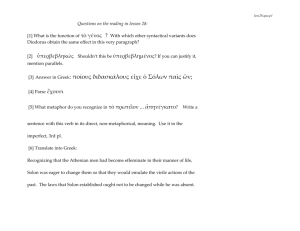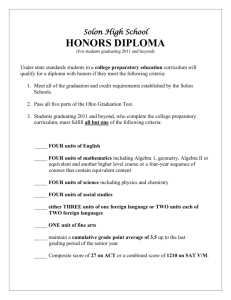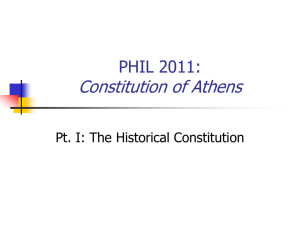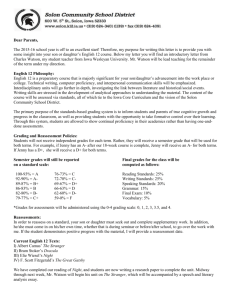Founding Democracy The democratic character of Solon's reforms
advertisement
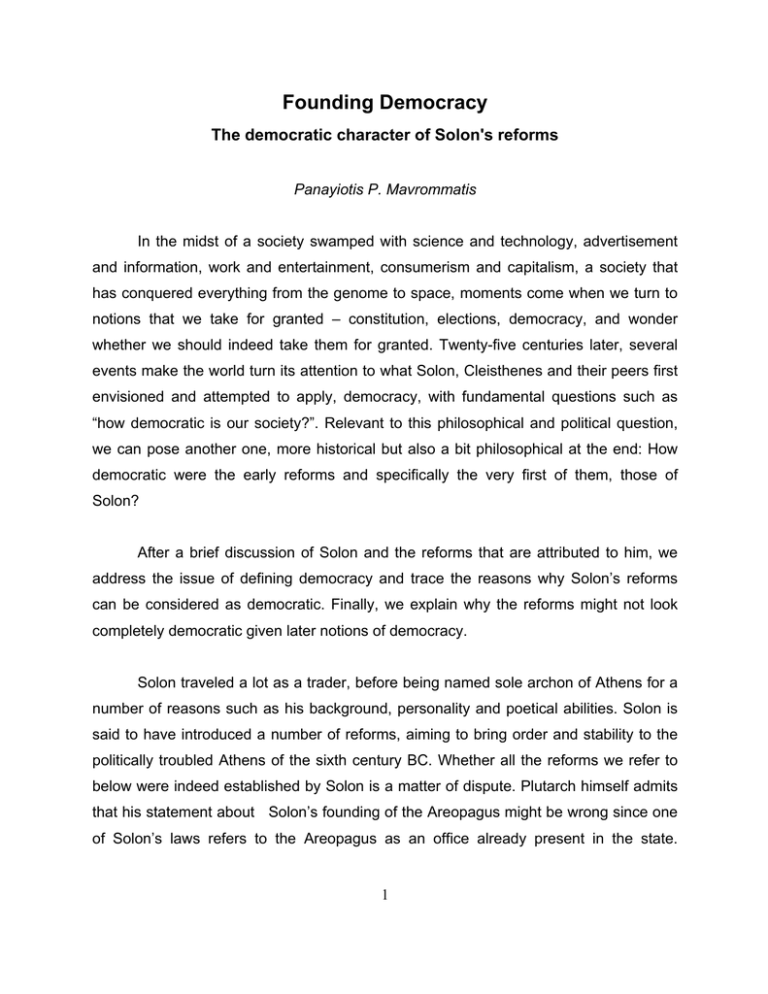
Founding Democracy The democratic character of Solon's reforms Panayiotis P. Mavrommatis In the midst of a society swamped with science and technology, advertisement and information, work and entertainment, consumerism and capitalism, a society that has conquered everything from the genome to space, moments come when we turn to notions that we take for granted – constitution, elections, democracy, and wonder whether we should indeed take them for granted. Twenty-five centuries later, several events make the world turn its attention to what Solon, Cleisthenes and their peers first envisioned and attempted to apply, democracy, with fundamental questions such as “how democratic is our society?”. Relevant to this philosophical and political question, we can pose another one, more historical but also a bit philosophical at the end: How democratic were the early reforms and specifically the very first of them, those of Solon? After a brief discussion of Solon and the reforms that are attributed to him, we address the issue of defining democracy and trace the reasons why Solon’s reforms can be considered as democratic. Finally, we explain why the reforms might not look completely democratic given later notions of democracy. Solon traveled a lot as a trader, before being named sole archon of Athens for a number of reasons such as his background, personality and poetical abilities. Solon is said to have introduced a number of reforms, aiming to bring order and stability to the politically troubled Athens of the sixth century BC. Whether all the reforms we refer to below were indeed established by Solon is a matter of dispute. Plutarch himself admits that his statement about Solon’s founding of the Areopagus might be wrong since one of Solon’s laws refers to the Areopagus as an office already present in the state. 1 Aristotle is also inconsistent at some points, as he mentions that Solon reformed the selection of magistrates in The Athenian Constitution but in the Politics he claims that no such change was made (Rhodes, A.C., Introduction). The above, along with some differences between the two writers regarding Solon, generate the question whether these reforms were indeed introduced by Solon. The answer to this question is not in the scope of this paper; we will instead consider the reports of Aristotle and Plutarch as valid and comment on the reforms they present to us. The first major reform attributed to Solon is the “disbursement”, or seisactheia. According to Plutarch, this was the cancellation of all debts, and Aristotle adds that the “loans on security of the person” were banned. (A.C, p. 50) This reform affected both rich and poor Athenians who had been involved in loans, mostly in favor of the poor. Moreover, a significant number of citizens became free. The second reform was the formation of four classes, based on the citizens’ wealth. A person belonged to the first class if he could produce more than five hundred measures of goods, to the second class for more than three hundred, to the third class for more than two hundred, and everybody else belonged to the last class, the thetes. Members of the first three classes could hold offices such as those of the archons and the treasurers. The last class gathered at the assembly and could act as jury in court. Another reform of Solon was the founding of the council of four hundred, the boulé. One hundred men from each of the four traditional tribes of Athens, but only from the first three newly-formed classes, formed the council that was responsible for processing public matters before bringing them to the assembly. Finally, Solon’s legal reforms were also significant. Anyone could appeal to the jury if a decision of the magistrates was not accepted. Furthermore, one could seek justice for other persons who could not represent themselves. These have been the main reforms characterized by several critics as democratic. As already mentioned, however, no single definition of democracy exists; in fact the issue is still open to many. A very rough listing of elements that are generally considered democratic could be the following: A constitution that defines the power of 2 every public office, free and just elections for public offices, the right to vote and to be elected, freedom of speech and press and equality before the law. In the light of these elements, but keeping in mind the social, economic and political context of those reforms, we attempt to present the reasons why Solon’s changes can be considered democratic. In short, democracy means power to the people. Solon introduced laws that gave people what they urged for, power. Firstly, all four classes could participate in the body of jurors that, according to Plutarch, turned out to be significantly powerful because “most disputes came to the hands of these jurors” (Lives, Solon XVIII, p. 453). The fact that Solon’s laws were not clear and simple might have been another reason why a lot of disputes arose and a lot of cases ended up in the jury-court (Aristotle, A.C. p 50). This practice is not uncommon even in modern law systems, where laws are written to give general guidance to the judge or the jury who take the final decision. Apart from the jury, the people were those who took the final decisions on crucial public matters, in the form of the assembly in which every citizen was encouraged to join. In fact, Solon introduced a controversial law punishing those who did not take part in public decisions on crucial matters, following the view that everybody should care about public issues. This law might not be accepted as democratic in general today, but it is still in dispute; in a number of nations citizens are obligated to vote. Moreover, Solon introduced elections for the appointment of public officers. According to Aristotle, the tribes elected a number of candidates, and the final decision was based on lottery (A.C.). It should be mentioned that a thete could not stand for election; however, the right to elect the government officers is undeniably fundamental to democracy. Finally, Solon’s laws decreased the power of the aristocratic archons and landlords of Attica. The seisactheia clearly favored the poor over the rich, and the distribution of offices to members of the middle classes reduced the power of the aristocracy. All these reforms, therefore, made Solon’s constitution democratic in the literal sense of giving power to the people. 3 Apart from the power that Solon gave to the public, the introduction of the four classes was an equally important step towards democracy. First, it was a step away from aristocracy, since a citizen’s class was determined by wealth, and not by origin, and all three upper classes could hold public offices. Secondly, Solon’s reforms gave the potential, at least, for anyone to hold public offices and exercise authority. Through hard work (or other means, of course), someone who would like to participate in politics more actively could overcome the barrier of the two hundred measures of goods and claim a position in the public offices. This was quite a revolutionary change from the original “aristocratic” way that officers were appointed in the past. As Aristotle states, officers’ appointment was solely based on the judgment of the Areiopagus, whose members were former archons, thus the circle of archons and other officers would remain closed. (A.C.) Another reason why one might be tempted to describe Solon’s reforms as democratic is the observation that these reforms have been the groundwork upon which Cleisthenes and Pericles built and established democracy later. Elements such as the assembly and the Boulé were enhanced by Cleisthenes, giving more power to the people. Ephialtes and Pericles further decreased the power of the Areiopagus. Moreover, the classification of citizens based on their property was taken a step further by Cleisthenes to the formation of ten tribes, in which neither origin nor property mattered, thus further decreasing the power of the rich. One could claim that democracy could not have been built overnight or in the course of a few years and by a single person. Rather, progressive men such as Solon, Cleisthenes, Pericles and the demand of justice, equality and freedom from the people of Athens gradually gave rise to what came to be known as democracy. In my view, Solon’s reforms could not have been much more democratic at the time. Further reducing the power of the rich would risk the acceptance of the reforms by the aristocracy, which would lead back to oligarchy. This could be supported by the fact that, even though Solon’s reforms were initially accepted, tyranny was not avoided a few years later. 4 These were the main reasons why people studying Solon and ancient Greece have been tempted to characterize his laws as democratic. On the other hand, one could argue that Solon’s constitution was not totally democratic as compared to the commonly accepted notions of democracy today, but also then, in the fifth century B.C. Firstly, only members of the three upper classes could hold public offices, for example be a member of the council or become archons. This opposes the fundamental right to be able to stand for election. This had another implication as well: A major portion of the population was not represented directly, i.e. by some of its members, in the public offices. Moreover, even within the three upper classes, the richest class had more political rights than the other two. Aristotle mentions, for example, that the treasurers had been appointed only from the highest class (A.C.). On the other hand, one could claim that something similar is still in effect in many nations today. Everybody is indeed free to stand for election, however, in order for one to have a substantial probability of being elected, a number of “unofficial” prerequisites such as education, background, occupation and even family origin exist. In summary, this paper has discussed a number of reasons why one might be tempted to characterize Solon’s reforms as democratic. The major arguments for this claim are that Solon’s reforms included a number of democratic elements, and that they were the basis for even more democratic changes later. The presence of a class system, though, upon which political rights were distributed, might not allow us to accept Solon’s constitution as a complete democracy. In any case, these reforms were certainly a work of a wise man, carefully written to be accepted at the time and to last throughout the ages, and one of the reasons why Solon was one of the seven sages of ancient Greece. 5
